| Srl | Item |
| 1 |
ID:
132382
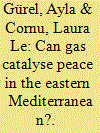

|
|
|
|
|
| Publication |
2014.
|
| Summary/Abstract |
The economic rationale for energy collaboration between Turkey, Cyprus and Israel is compelling. Cyprus and Israel need commercially viable export routes for their gas while Turkey is eager to diversify and increase its gas supplies. Hydrocarbon resources could potentially be a catalyst for both bringing about a Cyprus settlement and a Turkey-Israel rapprochement. A trilateral cooperation scheme involving a Turkey-Israel pipeline and an LNG plant in Cyprus could offer strong commercial incentives to all parties. But it would require bold political vision on the part of the region's leaders, coupled with backing from influential external actors with an interest in reconciliation and stability in the Eastern Mediterranean.
|
|
|
|
|
|
|
|
|
|
|
|
|
|
|
|
| 2 |
ID:
127572
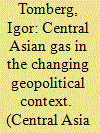

|
|
|
|
|
| Publication |
2012.
|
| Summary/Abstract |
The 21st century has confronted mankind with hitherto unknown dangers: the planet's natural resources, particularly energy supplies, have been depleting at a fast pace, which has stirred up fierce and mounting rivalry over hydrocarbons and other raw materials. In 2011, the growing instability in North Africa and the Middle East added fuel to the smoldering fire, increased the volatility of the energy markets, and cast doubts on continued and consistent fuel supplies from these and adjacent regions. Central Asia, in turn, is potentially threatened by the unwelcome developments around Afghanistan and Iran; ambitious investment projects (particularly in the energy sphere) are being jeopardized since investors are justifiably worried that a conflict with Iran might spread, in one form or another, to its Caspian neighbors.
|
|
|
|
|
|
|
|
|
|
|
|
|
|
|
|
| 3 |
ID:
111770
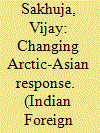

|
|
|
| 4 |
ID:
154342


|
|
|
|
|
| Summary/Abstract |
In the past half-decade, the role of the Gulf in the international political economy has changed dramatically. The region’s position as a supplier of world hydrocarbons has slipped, even as local consumption of oil and gas continues to expand. Gulf investments have shifted from the industrialized countries to the Middle East and North Africa. Saudi Arabia no longer exercises disproportionate influence in the Group of 20. Finally, relations with the People’s Republic of China and India have become truly interdependent, which gives the Gulf the capacity to exercise leverage over these two rising powers, despite its diminished position in global affairs.
|
|
|
|
|
|
|
|
|
|
|
|
|
|
|
|
| 5 |
ID:
193262
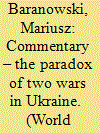

|
|
|
|
|
| Summary/Abstract |
The central thesis of this commentary focuses on the paradox of two wars occurring in parallel with Russian aggression in Ukraine. It is not just that—in addition to military action—there is a geopolitical tsunami and its consequences in the form of a possible food crisis, mass migration, or an already open energy war. The paradox relates to the fact that a potential Ukrainian victory could have adverse effects on the welfare of European countries as a consequence of the embargo on Russian hydrocarbons and the need to replace them (assuming there is no return to the ancien régime before the Russian aggression of February 24, 2022). The defeat of the Ukrainians, on the other hand, could lead to a so-called “new opening” and a gradual return to the import of Russian energy resources (which, although they will not obtain the pre-war volume, will provide energy stability for Europe in a period of diversifying contracts and developing investments in renewable energy sources).
|
|
|
|
|
|
|
|
|
|
|
|
|
|
|
|
| 6 |
ID:
152823
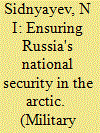

|
|
|
|
|
| Summary/Abstract |
This paper covers issues of Russia's national security in the Arctic as viewed from the military perspective. It examines the trends in the development of a reliable defense system for this country. It postulates the importance of greater defense capacity in the Russian Arctic, as NATO relentlessly builds up its military forces next to Russian borders, and the US military infrastructure continues to develop.
|
|
|
|
|
|
|
|
|
|
|
|
|
|
|
|
| 7 |
ID:
105537
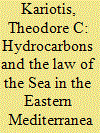

|
|
|
| 8 |
ID:
138389
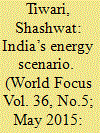

|
|
|
|
|
| Summary/Abstract |
Energy security shall remain an inter-play of demand and supply scenarios, which in themselves are influenced by a number of factors which need careful evaluation and consideration over the long-term. India has presence of dynamic private sector and a burgeoning middle class, however it faces growing challenges to maintain its economic growth. In the first quarter of 2012, the Indian economy grew by 5.3 per cent, which is the lowest in the past ten years. With increase in trade and budget deficits, there are challenges associated with a depreciating currency. To continue with the economic growth an accelerated transition to an energy sector based on market economy is the call of the hour.
|
|
|
|
|
|
|
|
|
|
|
|
|
|
|
|
| 9 |
ID:
087814
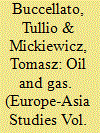

|
|
|
|
|
| Publication |
2009.
|
| Summary/Abstract |
Building on earlier work on regional inequality in Russia the article seeks to demonstrate that the regional oil and gas abundance is associated with high within-region inequality. It provides empirical evidence that hydrocarbons represent one of the leading determinants of an increased gap between rich and poor in the producing regions. The discussion focuses on a possible cluster of geographic, economic and political factors underlying the phenomenon.
|
|
|
|
|
|
|
|
|
|
|
|
|
|
|
|
| 10 |
ID:
089332
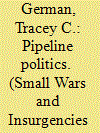

|
|
|
|
|
| Publication |
2009.
|
| Summary/Abstract |
The development of new energy export infrastructure, which bypasses Russia, has constituted a fundamental element of US and European engagement with the Caucasus in recent years, but has, to some extent, undermined Moscow's hegemony in an area that it considers to be its own 'strategic backyard'. This article examines the validity of the argument that Russian military intervention in Georgia in August 2008 was motivated by so-called 'petro-politics' and a desire to punish Tbilisi for its overt pro-Western orientation. It analyses the significance of the pipelines that transit Georgia and their implications for European energy security, together with the potential consequences of the 2008 conflict for future infrastructure developments.
|
|
|
|
|
|
|
|
|
|
|
|
|
|
|
|
| 11 |
ID:
151258
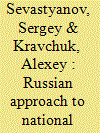

|
|
|
|
|
| Summary/Abstract |
This article is devoted to the research of military and economic aspects of national security of the Russian Federation in the Arctic. The authors consider national riches as the country`s main security object in the region. This work describes basic measures undertaken by Moscow over recent years to improve Russia`s defense capabilities as well as main components of its economic policy in the Arctic. It also analyses positive and negative factors that could influence implementation of Russia`s energy and infrastructure projects in the Arctic. Finally, in the context of the so-called “Russian pivot to the East” the authors assess prospects of Russian cooperation with Asia-Pacific nations (especially China, South Korea and Japan) in the Arctic.
|
|
|
|
|
|
|
|
|
|
|
|
|
|
|
|
| 12 |
ID:
069001
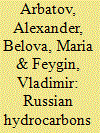

|
|
|
| 13 |
ID:
167181


|
|
|
|
|
| Summary/Abstract |
By utilizing the theory of Strategic Action Fields (SAFs), the present article explains how a new meso-level social order seems to have emerged in Mexico as a result of the paramilitarization of organized crime, militarization of security, and the opening of Mexico’s energy sector to private investment. This work describes the transformation of Mexico’s energy field after a process of major constitutional and economic changes that were the consequence of a security crisis and an agenda of energy reform for which the so-called ‘drug war’ was a key underlying foundation.
|
|
|
|
|
|
|
|
|
|
|
|
|
|
|
|
| 14 |
ID:
108044
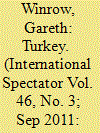

|
|
|
|
|
| Publication |
2011.
|
| Summary/Abstract |
Officials in Ankara are pressing for Turkey to become a key energy hub for the transportation of hydrocarbons from the Caspian region and the Middle East to Europe. It appears that they are seeking to secure certain strategic and economic advantages. Turkey's increasing energy needs could be satisfied, re-export rights obtained, and ambitions to become a significant regional state fulfilled which could facilitate accession to the EU. It seems more likely, though, that Turkey will become an important energy transit state, especially for the Southern Gas Corridor. Here, Turkey could still diversify its gas imports and reduce dependence on Russia.
|
|
|
|
|
|
|
|
|
|
|
|
|
|
|
|
| 15 |
ID:
159281
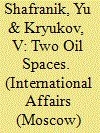

|
|
|
|
|
| Summary/Abstract |
OIL IN RUSSIA plays a special role in putting the economy on a path of steady development that cannot be ignored. These specifics to a very large degree arise from the incredible vastness of the country's territory.
|
|
|
|
|
|
|
|
|
|
|
|
|
|
|
|
| 16 |
ID:
143723
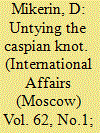

|
|
|
|
|
| Summary/Abstract |
DEALING WITH THE GAMUT OF ISSUES that have caused disputes over the legal regime governing the use of the Caspian Sea is one of the priorities of Russian foreign policy. From time immemorial, the Caspian Sea has been a natural protector of our southern borders. It plays a strategic role as the crossing point of transportation routes between Europe and Asia, contains extremely rich offshore hydrocarbon reserves, and its waters are populated by a unique diversity of fish. The Caspian is a zone of our vital interests. Three regions of Russia are situated along its shores with 1.2 million people living in their coastal areas. The life of these people is directly or indirectly linked to the Caspian Sea, and their future largely depends on what path that region follows in its development and on whether there is domestic stability and peaceful coexistence among the five littoral states for which the vast landlocked sea is a shared legacy and a potential source of wealth for the future. Our neighbors share our criteria in assessing the significance of the Caspian Sea for themselves.
|
|
|
|
|
|
|
|
|
|
|
|
|
|
|
|